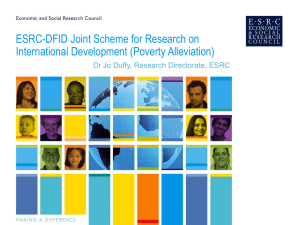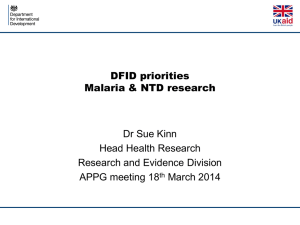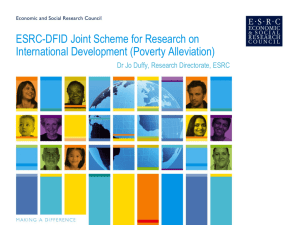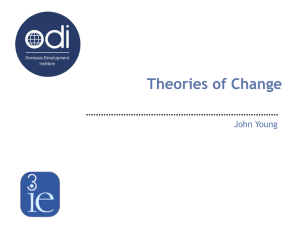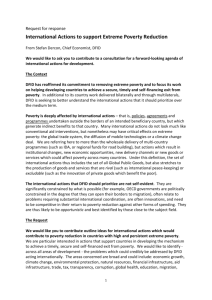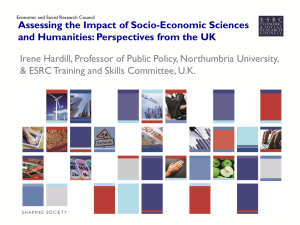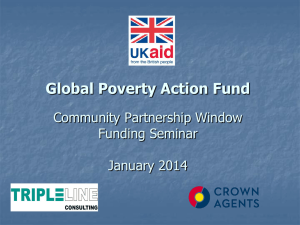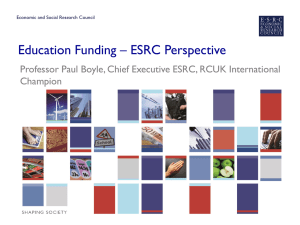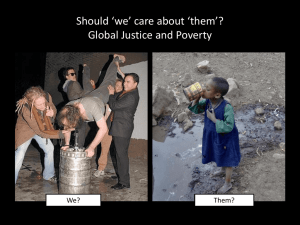PRARI workshop on participatory methods
advertisement
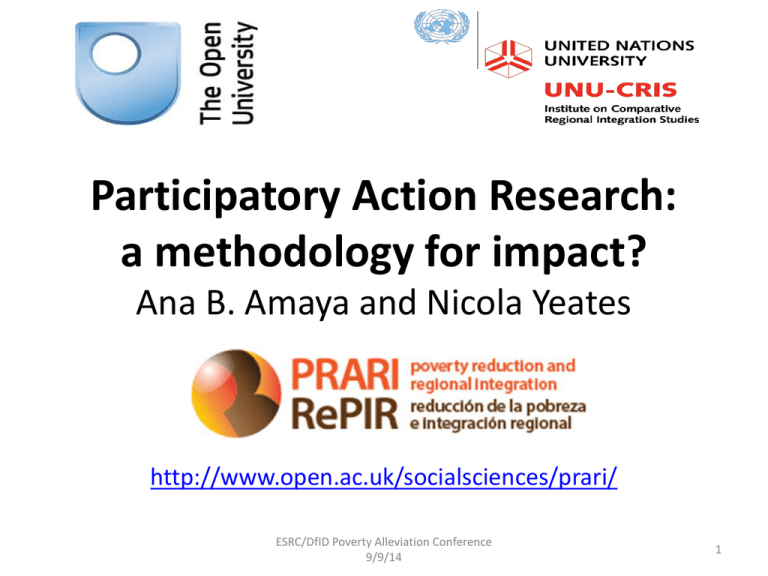
Participatory Action Research: a methodology for impact? Ana B. Amaya and Nicola Yeates http://www.open.ac.uk/socialsciences/prari/ ESRC/DfID Poverty Alleviation Conference 9/9/14 1 Poverty Reduction and Regional Integration (PRARI) - What regional institutional practices and methods of regional policy formation are conducive to the emergence of embedded pro-poor health strategies, and what can national, regional and international actors do to promote these? - Comparison of UNASUR and SADC - Development of a ‘toolkit’ of input, process, output and outcome indicators that capture regional policy change and pro-poor regional health policy success ESRC/DfID Poverty Alleviation Conference 9/9/14 2 What is PAR? “PAR is a reflective and collaborative process of problem-solving. It generally applies within social learning contexts, where multiple actors collectively define the problem and objectives, and work towards solutions. Iterative cycles of action and reflection make change processes more robust by ensuring that learning and sharing take place, that actions are adjusted to align with objectives, and that the actors themselves learn and adapt” (New pathways to resilience IDRC/CRDI/DfID). • PAR is an orientation, not a method. What distinguishes it from conventional research is: – the methodological contexts of the application of methods and – the location of power in the stages of the research process (Cornwall and Jewkes 1995) ESRC/DfID Poverty Alleviation Conference 9/9/14 3 Participatory and conventional research: a comparison of process (Cornwall and Jewkes 1995) What is the research for? Participatory research Action. Who is the research for? Local people. Whose knowledge counts? Local people’s. Topic choice influenced by? Local priorities. Conventional research Understanding with perhaps action later. Institutional, personal and professional interests. Scientists. Role of researcher Funding priorities, institutional agendas, professional interests. Facilitator, catalyst. Director. Methodology chosen for? Empowerment, mutual learning. Disciplinary conventions, ‘objectivity’ and ‘truth’. ESRC/DfID Poverty Alleviation Conference 9/9/14 4 Who takes part in the stages of research process? Problem identification Local people. Researcher. Data collection Local people. Researcher. Interpretation Local concepts and frameworks. Local people. Disciplinary concepts and frameworks. Researcher. Locally accessible and useful. Integral to the process. By researcher to other academics or funding body. Separate and may not happen. Who takes action? Local people, with(out) external support. External agencies. Who owns the results? Shared. The researcher. What is emphasised? Process. Outcomes. Analysis Presentation of findings Action on findings ESRC/DfID Poverty Alleviation Conference 9/9/14 5 People are contracted into projects directed by researchers to take part in their enquiries or experiments Consultative People are asked for their opinions and consulted by researchers before interventions are made Researchers and local people work together on projects designed, initiated and managed by researchers Collaborative Collegiate Researchers and local people work together as colleagues with different skills to offer, in a process of mutual learning where local people have control over the process ESRC/DfID Poverty Alleviation Conference 9/9/14 Ownership devolved----------------Researcher-controlled Contractual Deep ------------------------------> Shallow Continuum of participation in research projects (Cornwall and Jewkes 1995) 6 What about impact? 1. How is PAR relevant for research uptake and impact agendas? 2. What are the opportunities, tensions, and dilemmas of PAR in impact contexts? ESRC/DfID Poverty Alleviation Conference 9/9/14 7 Why are we using collaborative PAR for PRARI? • Co-production enhances potential for impact • Development of a useful tool that responds to expressed need, priorities and available data • Project team bring expertise and experience and can; and can also learn from partners • Ownership • Capacity building • Generating dialogue and partnerships • (democratic) accountability • Project timeframe - funder priorities ESRC/DfID Poverty Alleviation Conference 9/9/14 8 How will we use collaborative PAR? • Collaborative work with identified partners in South America and Southern Africa involving • Intensive and iterative processes of identifying needs, data, priorities through • Interviews, focus groups, workshops; pilot • Research team-managed communication (face-to-face, ICTs), with and among partners • Workshops, Briefings and conference for uptake, dissemination and impact ESRC/DfID Poverty Alleviation Conference 9/9/14 9 Challenges • Collaboration is time-intensive, requires trust • Mobilising and sustaining partner participation, trust, and commitment to the process and results of the research • Differences of expectations, opinion, interpretation, institutional agendas, desirable outcomes • Power imbalances • Toolkits need to be implementable and endure over time; context-specificity vs generalisability • Impact tends to be seen in the long-term (whereas short project lifespan) ESRC/DfID Poverty Alleviation Conference 9/9/14 10 Conclusions • PAR methods have tangible relevance for uptake and impact agendas • The research ‘problem’ of creating and sustaining a participatory community supportive of research objectives takes a distinctive turn in an impact context • Different modes of PAR bring different benefits and challenges • Importance of impact planning and flexibility ESRC/DfID Poverty Alleviation Conference 9/9/14 11
